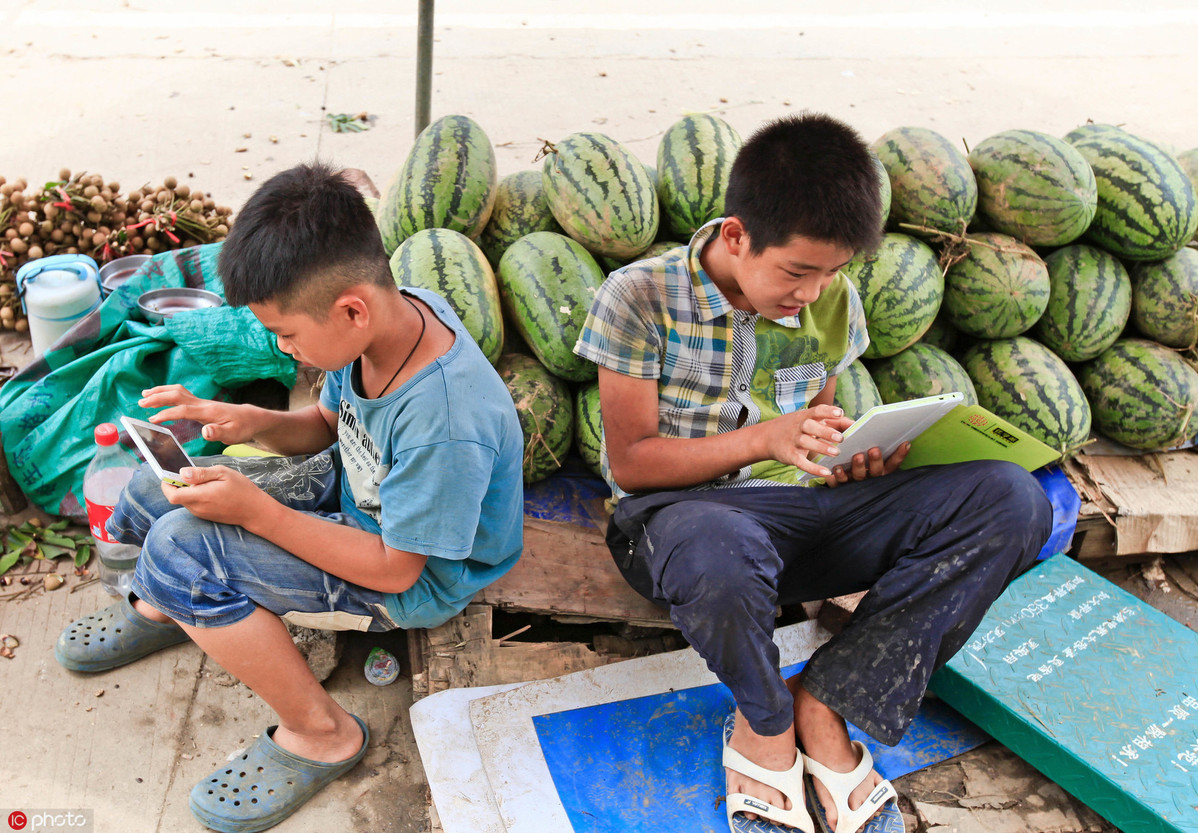
From the People's Daily app.
And this is Story in the Story.
Children in rural areas of China are spending more time gazing at handsets and computer screens than their peers in cities.
A study by the China National Children's Center found that after the school day ends, youngsters nationwide now spend more time in front of mobile and computer screens playing games and chatting, over 43 minutes a day, than they do reading.
The center's annual report on Chinese children's development (2019) notes a striking difference in screen time between children in the countryside and their counterparts in cities, with the average youngster in rural areas spending 20 percent more time using electronic devices.
And unlike children in big cities with loads of homework and access to different kinds of classes, kids in rural areas seem to have no choice but to spend more time on mobile gaming, since the entertainment and education resources are scarce.
Today’s Story in the Story looks at why there is a discrepancy between rural and city kids on how much time they spend on electronic devices.
Two children play cellphone games in Liuzhou, Guangxi Zhuang autonomous region, Aug 19, 2015. (Photo: IC)
The findings are based on a study involving 15,000 children from kindergarten to middle school. Respondents were spread across urban and rural areas in 10 cities, including Beijing, Guangzhou, Guangdong province and Duyun, Guizhou province.
Sun Hongyan, director of the childhood research institute at the China Youth and Children Research Center, said the internet and electronic devices used to be luxuries for rural children. But the increasing affordability of smartphones made it easier for migrant worker parents to provide electronic devices to children left behind in their hometowns.
According to the China Internet Network Information Center, the number of rural internet users reached 222 million by the end of 2018, accounting for 26.7 percent of the nation's online population.
"It's been getting harder for parents to monitor a lot of what their kids are seeing and doing, especially when they are not around," Sun said. "At the same time, they're relying on the seeming safety benefit of being able to keep kids at home with a device."
The report also found that children increasingly preferred playing electronic games and chatting online instead of other after-school activities such as reading and outdoor exercise. This was having a negative effect on their developing social skills, as well as impairing vision.
Sun Yunxiao, a specialist at the Chinese Association of Education, said schools should pay more attention to fostering children's internet literacy to make them "masters" rather than "prisoners" of the internet.
"It's nearly impossible to ban children from electronic devices since they are everywhere," Sun said. "But schools can provide more courses to help children fully realize both the positive and negative aspects of the internet."
Away from the pressures of school and with parents working in Beijing, Xiaolong has immersed himself in the world of mobile entertainment. “If I don’t play smartphone games, what else can I do?”
The junior student from north China’s Hebei Province might be right. Unlike children in big cities with loads of homework and access to different kinds of classes, kids in rural areas seem to have no choice but spending more time on mobile gaming, since the entertainment and education resources there are scarce.

Kings of Glory, the most popular game among children in rural China. (Photo: CGTN)
Students used to skip classes to go to Internet cafes to play games on desktops, but the prevalence of portable devices means that more children are now turning to mobile games.
According to Liu Chengliang, a researcher in the China Rural Governance Research Center under Huazhong University of Science and Technology, parental neglect can contribute to children in rural areas indulging in such games.
Research shows that left-behind children are spending more time on playing smartphone games than other children of similar ages. Many of them have ticked the boxes for playing 4 hours a day or more.
“Some parents in rural places are realizing the harm of children addicted to playing smartphone games, while most of them still think of smartphones as an ‘electronic babysitter’ – children won’t wander everywhere if they play with smartphones,” said Zhang Haibo, director of the children education research center in the Youth Palace Association.
The World Health Organization (WHO) has officially classified "gaming disorder" as a mental health condition. It defines it as “a pattern of persistent or recurrent gaming behavior ('digital gaming' or 'video-gaming'), which may be online (i.e. over the Internet) or offline."
(Produced by Nancy Yan Xu, Brian Lowe, Lance Crayon, and Paris Yelu Xu. Music by: bensound.com. Text from China Daily, CGTN)


